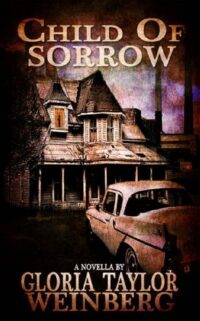Title: Child of Sorrow
Author: Gloria Taylor Weinberg
Publisher: CreateSpace
ISBN: 0615819109
Genre: Fiction
Pages: 64
Reviewed by: Allison Walker
Hollywood Book Reviews
There were not a lot of options for unwed mothers in the 1950s and ‘60s. When teen girl Vicki tells her parents she is pregnant, they waste little time in packing her away to a home for unwed mothers and inventing a lie to cover up Vicki’s sudden absence. For Vicki, though, morning sickness is nothing compared to the way her pregnancy is traded for personhood. Child of Sorrow, a novella by author Gloria Taylor Weinberg, tells the nearly unbelievable story of many women of the pre-abortion era. Ostracized and belittled, Vicki must give up everything in order to give birth to her son, only to have him taken away from her in the end.
The most terrifying part of Weinberg’s novella is really how little control Vicki has from the moment she divulges the secret of her pregnancy. Remember that Vicki’s character is also representative of how many women were treated during this time. Many decisions are made for her, right down to what she eats, how often and how much. She doesn’t seem to be given very much information about what is happening to her or what is going to happen to her. For example, in the delivery room, Vicki is not treated well. As a person, she is not given respect and her condition receives very little concern by the nurses. Postpartum becomes a very confusing time with her son being taken from her, then given back, then ultimately taken forever. Vicki doesn’t consent to the adoption but is treated abominably, and she spends the rest of her life looking for her lost son.
Vicki’s exchanges with her parents throughout the pregnancy are absolutely heartbreaking. Weinberg really portrays the conflict Vicki’s parents feel between shame of her condition and the desire to care for her as their daughter. While Vicki’s mother can barely look her in the eye when the family checks Vicki into the home for unwed mothers, she is also insistent that she be in the hospital room with Vicki when her daughter goes into labor. As for Vicki, she responds to her family’s conflict with a mixture of guilt for putting them into this situation but also grief at their inability to emotionally support her. While some of the girls at Safe Haven have come from hideously traumatic situations, it’s Vicki’s interpersonal life that really drives into your heart the societal and familial situation the unwed mothers are forced into.
As a novella, Child of Sorrow is well-paced and perfectly planned. Weinberg pockets information neatly throughout a story which, happening in the course of five months, delivers all of the necessary details while progressing at a satisfying pace. As an author, and maybe due to her background as a journalist, Weinberg has good judgment for giving all of the necessary information and cutting the fat off the story. She writes an emotionally gripping novella, one that is sad by content and horrifying by truth.
Vicki’s story comes to a very bittersweet ending, and unfortunately, one that is probably all too common. In many ways, Vicki’s son was always her “child of sorrow.” Weinberg’s novella is poignant and important. In some ways it’s difficult to believe a person could be treated with so little consideration for her feelings and in other ways it reads horrifyingly familiar. It’s these little gems of books, like Child of Sorrow, that our society needs more of: stories that shout at us to listen because something is seriously wrong.

